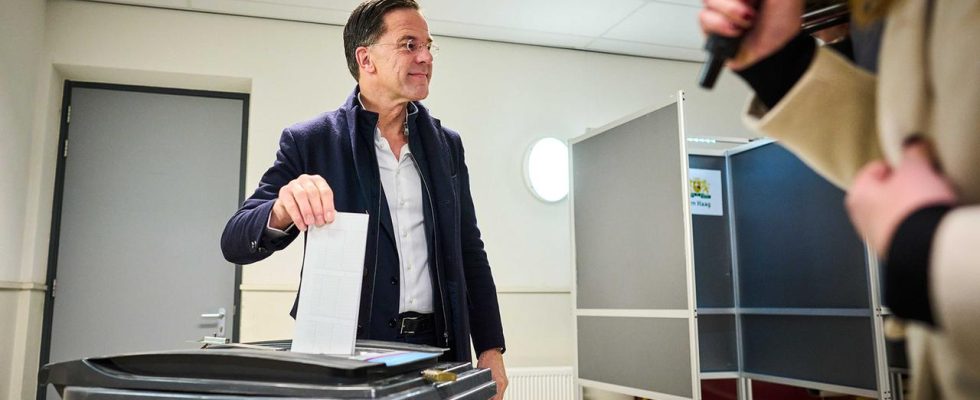The parliamentary elections have begun in the Netherlands. Who will succeed outgoing Prime Minister Rutte? A complicated majority situation is expected – even a minority government is not ruled out.
It is completely normal for the Dutch to vote after work. Since 1918, elections have been held during the week. The Netherlands is Protestant, where Sunday is considered a special day of rest away from politics. The smaller parties in particular have always campaigned for election day during the week – especially those that are church-based such as the Christian Union CU and the Reformed Political Party SGP.
For a seat in parliament, 0.67 percent is enough
There is no five percent clause in the Netherlands. 0.67 percent of the vote is enough for a seat in parliament. Even though Wednesday is a working day, like in the last elections, voter turnout this time is relatively high and, according to official information, is likely to be well over 70 percent.
On Tuesday evening, the nine largest parties were able to promote their policies again in a discussion on Dutch television. The most important topics: immigration, climate change and the widespread housing shortage. The last topic recently pushed migration into the background.
There are a lot of missing apartments
The government under Mark Rutte has restricted public funding for housing construction in recent years. The market should ensure a sufficient number of apartments. But there is now a massive shortage of housing all over the country. Municipal housing associations estimate that Dutch people will have to wait up to ten years for social housing and are calling for a state-run new building program.
Although the maximum rent here is only around 900 euros, hardly anyone can get an apartment. Single parents are particularly affected. The number of homeless people has risen sharply within a short period of time. And according to real estate associations across the country, anyone who wants to buy a single-family home will hardly find one for less than 400,000 euros.
Former Christian Democrat Omtzigt could soon join the government
During the election campaign, the housing issue has played into the hands of a new party that is promising improvement here. The 49-year-old former Christian Democrat Pieter Omtzigt made a name for himself as the shepherd of various scandals in Rutte’s government and promises a “new political culture” – and more living space.
He castigates the country’s and the EU’s climate policy as an elite project that is only affordable for the wealthy. His NSC party rose sharply in the pre-election polls, even taking first place a few weeks ago – but then slipped again. It is not unlikely that he could soon join the government.
The Netherlands is a coalition country. Alliances of at least four parties are common. It now looks like a shift to the right.
Cooperation of the Liberals with Right-wing populists?
The liberal top candidate of the previous ruling party VVD, Dilan Yesilgöz, had positioned herself as a power-conscious tactician – and had deliberately not ruled out working with the right-wing populist Geert Wilders. The current justice minister with Kurdish roots definitely wants to take the lead.
Wilders, in turn, has been in parliament for 25 years. Rutte’s first government had to rely on the toleration of his PVV party, but quickly got rid of the Wilders people, who were still unpredictable at the time. Today Wilders, as “Geert Milders” – as it is called in the press – is accommodating towards the VVD. Although he called for a rigid anti-migration policy, he refrained from using shrill tones.
He woos Yesilgöz, who came to the Netherlands as a child of Kurdish parents. This means he is almost on the same path as the VVD candidate, who, despite her background, wants to implement a much more restrictive asylum policy and has aligned her liberal party further to the right.
Timmermans is fighting for a left-wing majority
On the other side of the political spectrum, former EU Commissioner Frans Timmermans is fighting for a left-wing majority for his list of Social Democrats and Greens. He also believes he has a good chance of becoming the future head of government. However, his main topic in the election campaign, climate policy, has fallen into the background. Migration played the main role. The ex-Christian Democrat Omtzigt had cleverly addressed the problem of the housing shortage in order to win over families.
According to political experts, Timmermans may have a harder time finding coalitions than other parties. It won’t work without coalitions. And so it will not be possible to estimate so quickly who will rule the Netherlands in the future. A lot will depend on how much weight the right-wing populist Wilders can bring to bear.
Possible minority government – tolerated by Omtzigt
Meanwhile, a possible minority government of the previous ruling party VVD is also being discussed, tolerated by the newcomer Omtzigt. In a TV interview, he admitted that he had “no desire” for complicated coalition negotiations that would achieve nothing. The Netherlands must learn that it is possible to govern with changing governments. And here Wilders could get involved again – as he did many years ago with the Rutte government.
What the long-time Prime Minister will do in the future remains to be seen. Most recently he put himself forward for an international position. Jens Stoltenberg’s chair as Secretary General of NATO will become vacant next year.
Andreas Meyer-Feist, ARD Brussels, currently The Hague, tagesschau, November 22nd, 2023 10:00 a.m

